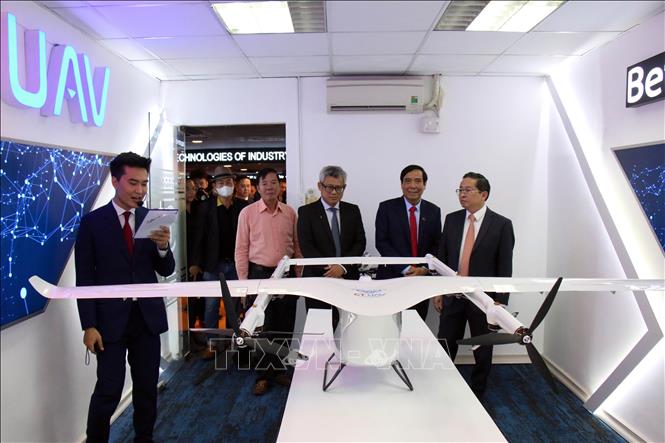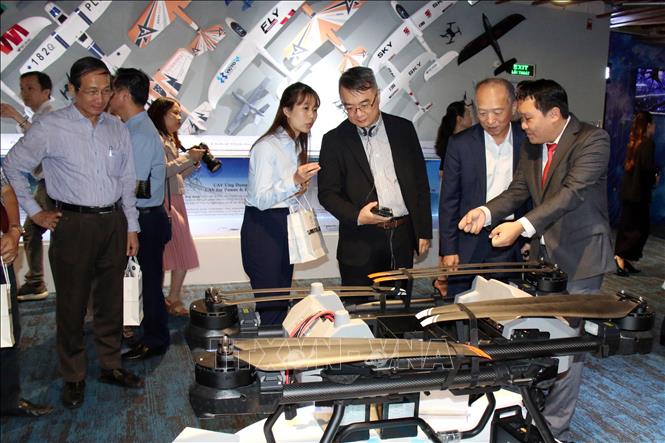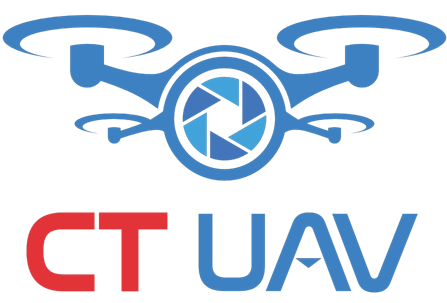(TTXVN) – The recent milestone of a Vietnamese enterprise securing an export order for 5,000 unmanned cargo aircraft (UAVs) to a South Korean company marks a historic breakthrough for the nation’s technology sector.

CT Innovation Hub 4.0 showcased numerous unmanned aerial vehicle (UAV) models.
For those in the technology field, this achievement is not entirely surprising. In recent years, Vietnamese enterprises have made significant investments in high technology, spanning infrastructure to human resources. Particularly since the issuance of Resolution 57-NQ/TW, followed by Resolution 68-NQ/TW, impressive milestones have been achieved.
Strong Investment
At the Vietnam – Korea Economic Forum on August 12 in South Korea, witnessed by General Secretary Tô Lâm and South Korean Prime Minister Kim Min Seok, a memorandum of understanding was signed between CT Group Vietnam and a South Korean UAV technology company, covering the export of 5,000 UAVs.
These are heavy-duty transport UAVs ranging from 60kg to 300kg, developed by CT UAV (a CT Group subsidiary), with a localization rate of up to 85% and proprietary Vietnamese technology highly regarded by international partners, including South Korea. Mastery in designing semiconductor chips for UAVs gives CT UAV a distinctive competitive advantage. At the same event, CT Group secured an ATP (Assembly – Testing – Packaging) export order of 100 million semiconductor chips for a South Korean partner.
These achievements are the result of the Group’s persistent investment in science and technology over the years. Since 2019, CT Group has been a pioneer in the Fourth Industrial Revolution, advancing from theoretical research to R&D, design, commercial production, and export.
In late April 2025, amid nationwide celebrations marking the 50th anniversary of National Reunification (April 30, 1975 – April 30, 2025), CT Group inaugurated its CT Innovation Hub 4.0 in Ho Chi Minh City and commenced Phase 2 of its CT Semiconductor chip manufacturing plant in Bình Dương.
The Innovation Hub is designed as a cradle to incubate and accelerate nine emerging technology sectors—priority fields under Resolution 57-NQ/TW of the Politburo on breakthroughs in science, technology, innovation, and digital transformation. These include: semiconductors, artificial intelligence, unmanned aerial vehicles, green digital currency, carbon credit exchanges, zero-emission modular housing, electric vehicles and metro systems, quantum computing, new energy, as well as genetics and cell technology. The model connects domestic and global resources to activate a high-tech innovation ecosystem.
According to CT Group Chairman Trần Kim Chung, the CT Innovation Hub 4.0 is not a theoretical simulation or a showcase of imported technologies. Instead, it demonstrates a complete 4.0 core technology ecosystem developed and owned by Vietnamese engineers. These include UAV prototypes, self-developed AI applications, semiconductor factory models, 4.0 modular housing, ESG technologies for sustainable growth, and pioneering research in genetic and cellular technologies.
CT Semiconductor is the first ATP chip factory in Vietnam developed with proprietary technology. Scheduled to begin operations in Q4 2025, it aims to produce 100 million chips annually by 2027, with significant investment in R&D.
Just six months after the implementation of Resolution 57-NQ/TW, on June 29, CT Group unveiled the ADC chip design CTDA200M, created by Vietnamese engineers. This 12-bit, 20 MSPS analog-to-digital converter (ADC) chip can be applied in medical imaging equipment, sensors, automation systems, IoT, UAVs, and wireless communications.
Mr. Trần Kim Chung emphasized that this is the first ADC chip designed entirely by Vietnamese engineers. Typically requiring two years of development, the team accomplished it in only six months, driven by the spirit of Resolution 57.
At the launch event, Ho Chi Minh City Chairman Nguyễn Văn Được affirmed that the unveiling of the ADC chip design marked a significant step in mastering core technologies, demonstrating Vietnamese creativity and resilience in the digital era. He emphasized that CT Group’s strategic efforts—from packaging, testing, and chip design to AI, IoT, and UAV applications—are clear evidence of leveraging internal strengths of domestic enterprises.
Beyond UAVs and chips, CT Group has also developed smart management software, AI-powered automated monitoring systems, IoT devices, smart city platforms, and next-generation sensor modules. These products not only meet domestic needs but also carry strong export potential.
Attracting High-Quality Talent

CT Innovation Hub 4.0 showcased numerous unmanned aerial vehicle (UAV) models.
Resolution 68-NQ/TW of the Politburo on private sector development sets not only growth targets but also expectations for private enterprises to become pillars of productivity, innovation, and global integration. In this context, CT Group has redefined its vision—from a diversified conglomerate into an innovation hub with a clear focus on core technologies.
Mr. Trần Kim Chung stated: “We are working with the Alliance of 4.0 Innovation Centers to ignite a culture of innovation among the youth. We aim to partner with the Government, ministries, enterprises, and intellectual communities at home and abroad to build a strong innovation ecosystem, contributing to sustainable socio-economic development.”
The Group is prioritizing transformative sectors with broad economic impact, such as future transportation infrastructure, semiconductors as the foundation of the digital economy, and the carbon credit market as part of the green economy. With its ecosystem of nine core technologies, CT Group seeks to embody the spirit of Resolution 68-NQ/TW and pioneer a new model of private enterprise—“self-reliant in technology, long-term oriented, and aligned with national strategies.”
To ensure sustainable growth, CT Group is investing heavily in human capital. Through venture funds, startup incubation programs, partnerships with domestic and international universities, and a network of experts and scientists, it is building a robust talent pipeline. Initiatives include the CTI Program with Cần Thơ University and the VNU350-CT Global Fellowship for Innovation with Vietnam National University, Ho Chi Minh City, providing $4 million to attract global scientists, experts, and innovators.
Assoc. Prof. Dr. Vũ Hải Quân, President of Vietnam National University HCMC, affirmed that human resources are the core factor in advancing frontier technologies such as semiconductors and quantum computing. Through collaboration with CT Group, both sides are mobilizing resources to bring leading scientists to Vietnam to jointly develop key projects.
At the “Vietnam Dreams Come True” seminar on July 25 in Taiwan (China), CT Group leaders called upon Vietnamese intellectuals, experts, and overseas communities to contribute actively to the nation’s development. This is considered a valuable resource, especially as Vietnam undergoes rapid transformation in technology, innovation, and digitalization.
Chairman Trần Kim Chung noted that one of the biggest barriers preventing experts from returning to Vietnam or engaging long-term is the lack of a sufficiently advanced technology ecosystem. To address this, CT Group is building a comprehensive high-tech ecosystem, gathering professors, experts, and engineers from the U.S., Taiwan (China), South Korea, Japan, and Europe.
Commenting on CT Group’s potential, Ben Tseng, Founder and Chairman of Arete Microelectronics, remarked: “This is an outstanding and admirable initiative. CT Group is developing an ecosystem with cutting-edge technologies, particularly semiconductors—a sector that plays a decisive role across modern industries.”
The strategic direction and achievements of CT Group not only embody the spirit of Resolutions 57 and 68 but also affirm that Vietnam can rise through technology developed, owned, and implemented by its domestic enterprises.
